
Felipe Caparrós - stock.adobe.c
Post Office Horizon IT scandal inquiry: Three years of shocking revelations
Nearly three years of shocking revelations from the Post Office Horizon scandal inquiry
The statutory public inquiry into the Post Office scandal went relatively unnoticed for almost two years, but in that time, those au fait with the case have been shocked on an almost daily basis.
The airing of ITV’s Mr Bates vs the Post Office drama and accompanying documentary in January 2024, eventually put the scandal centre stage in the public discourse and it is now getting the attention it deserves.
Computer Weekly has been following the inquiry since it began hearing evidence in May 2022. Here, we list some of the reports that make essential reading for those who are relatively new to the UK’s widest-ever miscarriage of justice.
When originally set up as a government department inquiry without the power to call witnesses, there was outrage and accusations of whitewashing. But following pressure from subpostmasters and their supporters, the inquiry was put on a statutory footing, with a judge in charge and the power to call witnesses to give evidence.
There have been seven phases of the inquiry, chaired by retired judge Wyn Williams. It began with the victims telling their stories. This was followed in October 2022 by phase two, which saw an investigation into the Horizon IT system, its procurement, design, pilot, roll-out and modifications. Then, at the beginning of 2023, came phase three, with the operation of the Horizon system under the spotlight. Phase fourth phase, which began hearing evidence in July 2023, shone the spotlight on the practices of the lawyers and investigators involved in the prosecutions of subpostmasters. In April, a combined phase five and six began and featured directors, politicians and civil servants who, whether deliberately or not, contributed to the cover-up. The latest phase to finish, phase seven, looked at the her and now and the future.
Each instalment has produced shocking evidence that has exposed barely imaginable malfeasance on the part of a British institution, once regarded fondly.
Read about the completed inquiry phases
- Phase one round-up: The British people are waking up to the scandal that happened under their noses.
- Phase two round-up: Post Office scandal – ‘cock-up or cook-up’?
- Phase three round-up: Post Office scandal – cover-up a ‘dark chapter’ in government, corporate and legal history.
- Phase four round-up: Post Office scandal: Phase four’s rogues’ gallery.
- Phase five and six round-up: Post Office scandal: Phase 5 and 6 islands of conscientiousness, depths of neglect
- Phase seven round-up: Post Office scandal: Inquiry’s final phase exposes dysfunction past and present
Computer Weekly first exposed the scandal in 2009, revealing the stories of seven subpostmasters, and has followed it closely ever since.
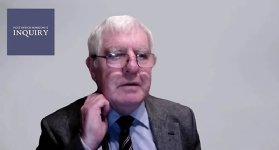
Inquiry chair Wyn Williams has been hearing evidence since May 2022.
Phase one – February 2022
Phase one of the inquiry heard witness statements from the victims of the scandal.
Former subpostmasters, their lives devastated after being held responsible for unexplained accounting, went through the painful experience of having to relive harrowing periods of their lives.
This was about two years before a dramatisation of their treatment put the Post Office scandal into public discourse and political debate.
When the drama was aired in January 2024, the public outrage was palpable, but it did not reveal anything new. What it did reveal was that the written word, of which Computer Weekly has written many thousands about the scandal since 2009, was not enough to catch the attention of the public. The drama did.
The drama was based on real lives – lives destroyed.
Here are all the recordings of evidence given to the inquiry by victims of the scandal telling their stories.
Phase two – October 2022
The Post Office scandal began with the procurement of Horizon software in the 1990s, after John Major’s government agreed to the public finance initiative (PFI) deal with ICL, later acquired by Fujitsu. Subpostmasters were promised the system would make their lives easier.
Automating accounting processes across thousands of branches was a logical step in the computer age, but the procurement and design of a system that was, at the time, the largest non-military IT project in the UK was anything but logical.
Warning signs were ignored during negotiations, which continued under Tony Blair’s premiership, and the subpostmasters ultimately paid the price.
At the end of phase two of the inquiry, Sam Stein KC, representing former subpostmasters, asked whether the scandal was the result of a “cock-up or cook-up”.
Problems from the start
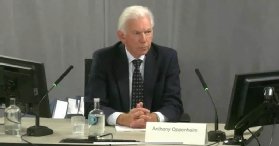
During an inquiry hearing in October 2022, Anthony Oppenheim, former commercial and finance director at ICL Pathway, which was the company set up by ICL/Fujitsu to run the Horizon project, said problems with the Post Office Horizon IT system reported before its roll-out should have been regarded as a “showstopper”, but weren’t.
The roll-out of Horizon should have stopped until reported problems were fixed, and subpostmasters having trouble balancing their books should have been given “the benefit of the doubt”, he told the hearing.
- Read Computer Weekly’s report from the inquiry hearing about problems reported with the Post Office’s Horizon IT system before its roll-out should have been regarded as a “show-stopper”.
- Watch Anthony Oppenheim’s evidence to the inquiry.
Premonition of Horizon tragedy
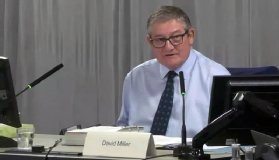
The public inquiry saw documents that revealed the feedback to the Post Office after live trials saw Horizon run in 300 offices in 1999. There were serious concerns over the software, which was causing “difficulties and trauma” for subpostmasters struggling to balance their accounts.
Former Post Office Horizon programme director David Miller said that in a meeting with the National Federation of Subpostmasters (NFSP) executive in 1999, there was a general discussion on the severe difficulties being experienced by subpostmasters.
- Read Computer Weekly’s report from the inquiry hearing about how trials of the Horizon computer system in Post Office branches in 1999 led to a warning from subpostmasters that software problems meant “a tragedy was not far away”.
- Watch David Miller’s evidence to the inquiry.
Horizon developers were a ‘joke’
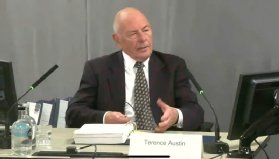
The teams developing the software were not up to scratch and were considered “the joke of the building” at Fujitsu/ICL UK.
During the questioning of Terence Austin, former systems programme director at ICL Pathway, it emerged that a taskforce was set up to investigate problems in Horizon’s electronic point of sale service (EPOSS) development. The taskforce reported that whoever wrote the code “had no understanding of elementary mathematics or the most basic rules of programming”.
Software developer David McDonnell told the inquiry that, when he arrived, the EPOSS development team was “like the Wild West” with “no standards, a lack of rules and no design”.
He said the team was “the joke of the building”.
- Read Computer Weekly’s report from the inquiry on how Horizon system code writers lacked basic programming skills, according to the taskforce set up to investigate reported problems with the controversial software.
- Read how the team working on controversial Post Office Horizon EPOSS software was the ‘joke of the building’.
- Watch Terance Austin’s evidence to the inquiry.
Hardball negotiation left subpostmasters vulnerable

Hardball negotiations between the government, the Post Office and ICL, which was acquired by Fujitsu, meant subpostmasters were ignored and thrown into a tragedy that could have been averted.
Former Post Office Counters managing director Stuart Sweetman told the inquiry the government was playing hardball because the Post Office had extracted quite a good deal from it.
He was asked about a Horizon Working Group meeting in June 1999, where it was said that despite serious problems, there was no question of postponing or delaying the project.
- Read Computer Weekly’s report from the inquiry on how playing a game of ‘hardball’ in Horizon negotiations left subpostmasters exposed to tragedy.
- Watch Stuart Sweetman’s evidence to the inquiry.
Confirmation bias
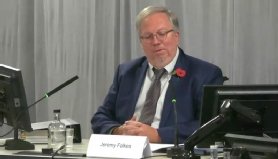
Post Office investigators were so convinced that subpostmasters were cooking the books that they failed to investigate alleged IT problems.
Jeremy Folkes, former senior tech lead at the Post Office, told the inquiry there was an understanding in investigation teams that there were concerns over the accounting system integrity, but they were ignored because people in the investigations and prosecutions side in the Post Office had confirmation bias.
- Read Computer Weekly’s report on how confirmation bias led the Post Office to prosecute subpostmasters without investigation.
- Watch Jeremy Folkes’ evidence to the inquiry.
Pressure from Japan
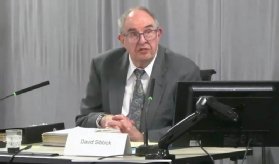
The inquiry heard how the Horizon project became a foreign affairs issue for the UK. Pressure was put on the UK government by IT supplier Fujitsu to sign off the contract when it was in doubt.
In 1998, the British embassy in Tokyo wrote to the UK government warning it of serious economic repercussions, including UK job losses, should the contract with the Post Office be cancelled.
During the inquiry hearing, former civil servant David Sibbick said there was “quite a lot” of time pressure coming from Fujitsu to get the contract done.
- Read Computer Weekly’s report on how a telegram from the British Embassy in Tokyo to UK government put pressure on ministers to sign off controversial Horizon contract.
- Watch David Sibbick’s evidence to the inquiry.
Federation failed its members
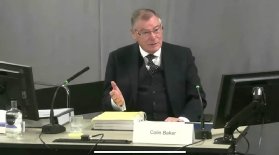
Part of the problem for subpostmasters is they never knew of the problems in the background until they were struck by them. The National Federation of Subpostmasters (NFSP) didn’t help. The organisation that was supposed to represent subpostmasters deliberately suppressed information about computer errors.
Colin Baker, former NFSP general secretary, said the organisation wanted the public to think the Horizon project “was fine”.
- Read Computer Weekly’s inquiry report on how the NFSP kept details of computer problems quiet.
- Watch Colin Baker’s evidence to the inquiry.
Post Office boosted its coffers
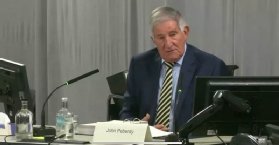
The public inquiry heard how the Post Office made financial gains when it forced subpostmasters to pay for losses in their branches that were caused by computer errors.
Former NFSP president John Peberdy told the inquiry the Post Office was keen to get subpostmasters to cover accounting shortfalls with their own money, rather than get to the bottom of what had caused them.
- Read Computer Weekly’s inquiry report on how the Post Office boosted its ‘coffers’ through forcing subpostmasters to cover unexplained shortfalls.
- Watch John Peberdy’s evidence to the inquiry.
Phase three – January 2023
Almost a year after the statutory public inquiry began, phase three moved it to the operation of the Horizon system. This was a large, complex system involving the interaction of computer hardware, telecoms connections and other software systems, and it was being introduced to users who largely had little or no experience of computers.
Closing phase three, Ed Henry KC, representing Post Office victims, said the scandal was “as dark a chapter in our governmental, corporate and legal history as can be imagined, and sadly, it will get darker yet”.
‘Hail the almighty Horizon’
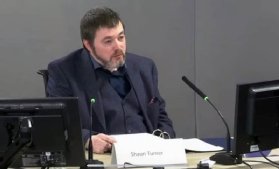
At the beginning of phase three, the inquiry heard that the Post Office sent messages to staff designed to reassure them that the Horizon accounting system was robust, after Computer Weekly first revealed problems in 2009.
Senior Post Office executives told staff as part of its internal messaging not to reveal problems caused by Horizon. Shaun Turner, a former senior executive working in the Post Office National Business Support Centre (NBSC), which supported subpostmasters using Horizon, told the Post Office inquiry he was aware “as a general theme” of the concern in Post Office that if the problems were known it would cause a lack of confidence in Horizon. He said he had this opinion “largely from the messaging that was coming out of the business”.
- Read Computer Weekly’s report from the inquiry looking at how the Post Office’s most senior executives hushed up Horizon errors.
- Watch Shaun Turner’s evidence to the inquiry.
Unrestricted, unaudited, unbelievable
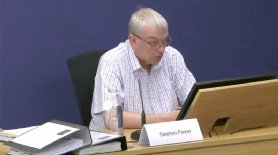
The Post Office was prosecuting people based on data from the Horizon system, data that should be 100% trustworthy. Yet staff in the Fujitsu support centre had unaudited access to subpostmaster accounts and could make changes without their knowledge.
Stephen Parker, a former manager at Fujitsu’s Software Support Centre, said staff remotely accessing branch systems simply relied on them being trustworthy and following the access policy, with no policing of their activity.
- Read Computer Weekly’s report from the inquiry about Fujitsu’s ‘unrestricted and unauditable’ remote access to Post Office branch systems.
- Watch Stephen Parker’s evidence to the inquiry.
‘Toxic, racist and rudderless’
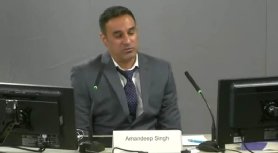
The people working in the support centres reported a toxic culture with poor leadership as well as some experiencing racism daily.
IT consultant Amandeep Singh worked at ICL on the Post Office’s Horizon helpdesk in Wakefield, Yorkshire, from 2000 to 2001. He told the inquiry that the helpdesk operation he was part of was rudderless, resentful, racist and undertrained to help subpostmasters. There was also a culture of not trusting the subpostmasters, he said.
- Read more about the chaotic Fujitsu Horizon helpdesk in this Computer weekly report from the inquiry.
- Watch Amandeep Singh’s evidence to the inquiry.
Celebrating miscarriages of justice
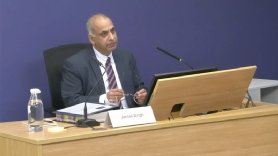
The Post Office used its legal teams and external lawyers to shut subpostmasters up and destroy them. Seema Misra, former subpostmaster in Byfleet, Surrey, was sent to prison in 2010 after being wrongly prosecuted for theft.
During the questioning of former Post Office executive Rod Ismay, in the latest Post Office Horizon scandal public inquiry hearing, evidence emerged of the gleeful response of Jarnail Singh, former head of criminal law at the Post Office, after the organisation defeated Misra in court over her challenges to the reliability of the Horizon accounting system.
Whitewash Horizon report
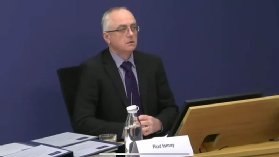
In 2010, amid claims subpostmasters were being blamed and prosecuted for accounting shortfalls caused by the Horizon system, the Post Office commissioned an internal report on its performance. The inquiry was told the report lacked objectivity and its aim from the outset was to give the software a clean bill of health.
There were no terms of reference for the report, which was instigated by then Post Office managing director David Smith, but it was made clear to the head of product and branch accounting (P&BA) Rod Ismay, who was tasked with completing the report, that he should just report on “positive reasons to be assured about Horizon” to give a clean bill of health to the software.
- Read Computer Weekly’s inquiry report about the ‘whitewash’ investigation.
- Watch Rod Ismay’s evidence to the inquiry.
Phase 4 – July 2023
Phase four of the statutory public inquiry ran for six months, punctuated by delays as a result of the Post Office’s failure to disclose information in a timely manner. Darkly ironic as the phase was investigating the Post Office’s legal practices when prosecuting subpostmasters, which included failure to disclose information to subpostmaster defence teams. The phase must be seen in the context that over 100 subpostmasters have had wrongful criminal convictions overturned, with about 800 more set to be quashed en masse when government legislation completes its journey through Parliament.
Summarizing phase four, Tim Moloney KC representing former subpostmasters said the phase had laid the ground for the very real prospect that former Post Office staff and those supporting the Post Office at external companies could face criminal investigation themselves. He said: “At worst, [their] actions now, as perhaps just a starting point, lay some witnesses open to rigorous criminal investigation.”
Changing stories

The inquiry heard that, in 2003 expert IT witness Jason Coyne was asked to report on the Horizon system as part of a dispute between a subpostmaster and the Post Office. In his independent report, which was ordered by the judge, he said there were clear problems with the technology. The Post Office tried to convince him that he was wrong about Horizon. When he refused to change his statement, it dropped its case with the subpostmaster and paid her off in a non-disclosure agreement.
Phase four heard from former Post Office auditor Helen Rose who was involved in a legal battle with former subpostmaster Lee Castleton, who was made bankrupt after challenging the Post Office in court after it blamed him for unexplained accounting shortfalls. She produced a witness statement in court that differed from her original audit report, which was favourable to Castleton. In her witness statement she said he had been drinking at the time of the audit, but in her audit report did not mention this.
- Read Computer Weekly’s report about how Helen Rose changed her story for witness statement used to destroy subpostmasters.
- Watch Helen Rose’s evidence in phase four of the inquiry.
No concern for welfare of subpostmasters
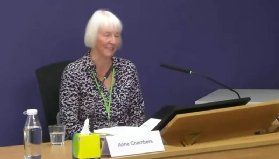
The Post Office’s primary consideration was to “defend the integrity of its [IT] system” when taking subpostmasters to court over unexplained accounting shortfalls, and not the subpostmasters’ welfare, according to a Fujitsu memo written in the aftermath of the court battle with Lee Castleton.
In the memo, former Fujitsu IT expert Anne Chambers wrote that the Post Office was not concerned about getting to the bottom of reported problems with the Horizon computer system because it wanted to protect its reputation.
- Read Computer Weekly’s report about a Fujitsu memo that said the Post Office had no interest in subpostmaster welfare.
- Watch Anne Chambers evidence to the public inquiry.
Robotic memory failure
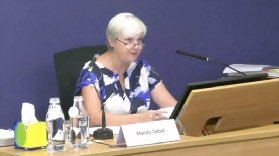
Memory loss has been a commonly recurring theme in phase four of the public inquiry. The selective memories of the lawyers and investigators involved in the prosecution of subpostmasters was never clearer than in the evidence of former Post Office lawyer Mandy Talbot. She was nicknamed “the Post Office’s very own evil robot” by a barrister representing victims of the scandal.
- In this Computer Weekly report, read more about how Talbot’s amnesia hid the names of individuals behind Post Office strategy.
- Watch Mandy Talbot’s evidence to the inquiry.
What witness statement?

Elaine Cottam, former retail line manager at the Post Office, told the public inquiry that, despite having signed a witness statement to be used in court, she has no recollection of writing it. The witness statement was to be used by the Post Office in a legal dispute with one of the over 100 branches she oversaw in her role.
During the hearing, Cottam denied any knowledge of the case and said she didn’t understand why she was giving evidence at the inquiry.
- Read Computer Weekly’s report on Elaine Cottam’s evidence in phase four.
- Watch Elain Cottam’s evidence to phase four of the inquiry.
‘They’re all crooks’
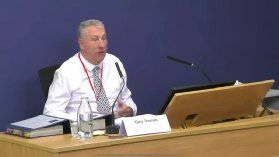
When Gary Thomas was asked why he was happy he had kept his old investigation papers he said: “I want to prove that there is no FFFFiiinnn [sic] ‘Case for the Justice of Thieving Subpostmasters’ and that we were the best investigators they ever had and they were all crooks!!”
The subpostmasters he was referring to went on to prove, in the High Court, that the Horizon system was error-prone and forced the government to establish a statutory public inquiry into the Post Office Horizon scandal.
- Read Computer Weekly’s report on former Post Office investigator labelling subpostmaster campaigners ‘crooks’.
- Watch Gary Thomas’s evidence in phase four of the inquiry.
Phase five and six – April 2024
Phases five and six of the inquiry, which combined two previously planned phases, had the monumental task of examining a huge range of complex issues. For example, it was tasked with understanding the investigation of the Horizon system carried out by forensic accounting experts Second Sight, the mediation scheme that followed (and its collapse), the Post Office’s conduct during a High Court group litigation, as well as how the organisation responded to the scandal and more.
Beginning in April 2024, it was always going to be a big one. It had all the makings of an epic – two phases condensed into one 16-week chunk, oral evidence from 66 people including former ministers, the current leader of the Liberal Democrats and a disgraced former Post Office CEO, for starters. For spice, add to that the appearance of usually stealth-like civil servants and two million pages of evidence, and the fact that this was the first phase of the public inquiry to be widely covered by the media, having come after the broadcasting of ITV’s dramatisation of the scandal.
Arise Sir Alan
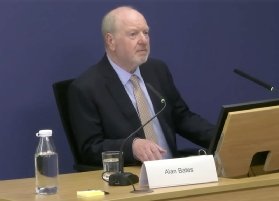
Bates had originally refused to take part in the inquiry, which was initially established as a non-statutory review lacking the powers of a statutory inquiry. He believed it would have allowed the government to “brush it under the carpet”. In a February 2021 letter to then prime minister Boris Johnson, Bates asked for the non-statutory Post Office Horizon IT Inquiry to be paused, be re-established as a statutory inquiry, and a public consultation be held on the terms of reference.
Bates’ refusal to take part was a significant message. It played an important part in the review being converted to a full judge-led statutory public inquiry.
In his evidence to the inquiry, Bates pointed the finger at civil servants, who he said were more to blame than politicians for the length of time the Post Office scandal had been allowed to run.
He said he was certain that the civil service and the Post Office were “briefing ministers in the direction they wanted”. Later evidence from ministers and civil servants didn’t contradict this assertion.
Read more about Sir Alan Bates’ oral evidence to the inquiry:
• Civil servants more to blame for Post Office cover-up than ministers, says Alan Bates
An illogical crime
Cook’s assertions that subpostmasters “had their hands in the till” defied logic, according to evidence from Anthony Hooper, a former Lord Justice of Appeal.
Hooper, who was tasked with settling disputes between the Post Office and subpostmasters in 2013, said it was clear from the start that criminal prosecutions against subpostmasters were “fundamentally implausible”. He said he told the then Post Office CEO Vennells and chair Alice Perkins this during one-on-one discussions in 2014.
Questioned about his experiences of dealing with the Post Office, he said: “I was trying to make it clear to Post Office that [its] case didn’t make sense. It did not make sense that reputable subpostmasters, appointed by the Post Office after examination of their character, would be stealing these sums of money. It didn’t make sense particularly because within a matter of days of any alleged theft, they had to balance the books. It just never made sense.”
Read more about Anthony Hooper’s oral evidence to the inquiry:
• Subpostmasters stealing from branches ‘didn’t make sense’, former judge tells inquiry
Lawyers behind the illogical prosecutions
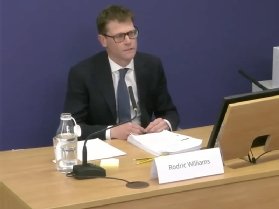
Sitting behind every prosecution was a team of lawyers. The public inquiry heard from them during the latest phase.
During questioning, it became clear that Post Office internal lawyer Rodric Williams turned his attention to all manner of Post Office challenges, while failing to meet the code of conduct of his chosen profession.
During the inquiry hearings, a barrister representing subpostmaster victims said Williams was at the centre of the “web” and “part of” attempts to hush up the Horizon scandal at the Post Office.
Through internal documents, it could be seen he was involved throughout the Post Office’s attempts to prevent knowledge of problems with the Horizon software becoming known outside the organisation.
Read more about Rodric Williams’ oral evidence to the inquiry:
• Post Office lawyer was a jack of all trades, but failed his own
Threats, obstruction and cover-up
Independent forensic accountancy firm Second Sight was contracted to investigate the Horizon system in 2012 after MPs forced the Post Office to get an external expert view.
Second Sight’s directors, Ian Henderson and Ron Warmington, are two of the heroes in the fight for justice. Their diligence, expertise and professionalism played a major role in lifting the lid on the Post Office’s behaviour.
The pair have been unable to speak about their experience in unearthing details of Horizon problems and prosecution malpractice for years, due to non-disclosure agreements. Their appearance in the latest phase was the first time they had spoken publicly.
During the session, they described Post Office cover-ups, threats, obstruction and the “worst corporate behaviour” seen in their long careers.
Henderson told the inquiry that when Second Sight’s investigation began, it quickly became apparent that subpostmasters had been wrongly prosecuted based on evidence from the Horizon system, with resulting miscarriages of justice.
Warmington described the investigators’ struggles in getting to the truth: “It was awful, just dealing with people who were not just seemingly failing to understand just about everything we said, but were, we now know – we suspected at the time – were in a sort of cabal that was colluding to or conspiring to thwart every move that we made.”
Read more about Second Sight’s oral evidence to the inquiry:
• Post Office Horizon investigators were blocked and threatened as they witnessed cover-up
The unholy CEO
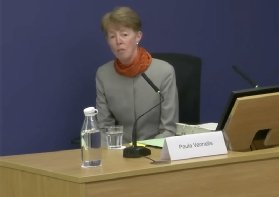
The long-awaited appearance at the inquiry of Paula Vennells, , Post Office CEO from 2012 to 2019, included the revelation that former Royal Mail CEO Moya Greene recently accused Vennells of knowing what was going on at the Post Office while its practices were destroying the lives of hundreds of subpostmasters.
Text exchanges between Vennells, a former priest, and Greene were revealed. Following the broadcast in January of the ITV Post Office scandal drama, Greene, who was Royal Mail CEO from 2010 to 2018, messaged Vennells questioning what she knew about the Horizon problems.
In the iMessage exchange, Greene wrote: “Paula, just back in the UK. What I have learned from the [public] inquiry/parliamentary committee is very damaging.
“When it was clear the system was at fault, the Post Office should have raised a red flag, stopped all proceedings, given people back their money and then try to compensate them for the ruin this caused in their lives.”
Greene was not alone in criticising Vennells’ deafness and blindness to what was going on around her. Alisdair Cameron, currently Post Office chief financial officer (CFO), who was interim CEO for a short period when Vennells left the organisation in 2019, was critical too.
In the inquiry, he was asked about a document he wrote in 2020 regarding what went wrong at the Post Office. In that he wrote: “Paula did not believe there had been a miscarriage and could not have got there emotionally.”
Asked by inquiry barrister Jason Beer KC what he based this view on, Cameron said: “Everything she sort of said at the time. She had been clear in her conviction from when I joined that nothing had gone wrong. This was stated in my very first board meeting and she never, in my observations, deviated from that.”
He agreed that she “had been unwavering in her conviction that there were no miscarriages of justice”.
Read more about Alistair Cameron’s oral evidence about Vennells:
• Post Office CEO Paula Vennells ‘didn’t believe there were miscarriages of justice’
During her questioning, Vennells was also asked about her role in removing a reference to the Post Office Horizon system in the IT risk section of a Royal Mail prospectus, as it was being floated on the stock market, and how she later bragged about doing so.
During the flotation of the Royal Mail in 2013, a prospectus was drawn up for potential investors. There was a reference in the risk section of the prospectus to the Post Office Horizon system, which at the time was being blamed for errors causing accounting shortfalls which subpostmasters were prosecuted for. Public knowledge of this could have been highly damaging to the flotation, with the prospect of wrongful convictions of subpostmasters and potential future challenges.
During the hearing, Vennells said she was not involved in the privatisation, but despite this, acknowledged that she took out the reference to Horizon. Documents showed she got in touch with the company secretary and said she didn’t understand why the reference was there and asked to have it removed, which it was. Vennells later boasted about it in an email to Post Office chair Alice Perkins. “I have earned my keep on this one,” she wrote.
Read more about Paula Vennells’ evidence to the inquiry:
• “You knew” – former ally accused Paula Vennells of knowing about Horizon problems
• Paula Vennells boasted about removing Horizon risk reference in Royal Mail flotation prospectus
The comms guy
A communications director central to the Post Office’s strategy to keep bad news out of the public eye said that he and others believed they were doing the right thing.
Mark Davies, former group communications and corporate affairs director at the Post Office, and the public relations team he ran played a role in obstructing journalists investigating allegations made by subpostmasters against the Post Office’s Horizon accounting system used in branches.
During his questioning in the public inquiry, the former communications director was asked by inquiry barrister Julian Blake whether he and others in his team had ever asked themselves, “Might we be the baddies?” Davies said many times: “We really believed we were doing the right things.”
But evidence shown in the inquiry revealed that in 2013, following news that former subpostmaster Martin Griffith was critically ill in hospital after attempting to take his own life, one of the first things Davies did was to tell the Post Office’s general counsel they needed to find a specialist media lawyer. At the time, Griffiths was being forced to repay unexplained account shortfalls on the Horizon system and was losing his Post Office branch. Griffiths died in hospital weeks later.
Read more about Mark Davies’ oral evidence to the inquiry:
• Comms director at centre of cover-up never thought Post Office were the ‘baddies’
The CIO who towed the conflicting line
Former Post Office IT boss Lesley Sewell had the opportunity to stop the organisation misleading the public over software errors, but went along with false public statements that were in conflict with her professional opinion.
During her public inquiry appearance Sewell, who joined the Post Office in 2010 and was CIO from 2012 to 2015, agreed with inquiry barrister Emma Price that people within the organisation knew about software bugs as early as 2006, and that she knew of a bug as early as 2011. She was asked by Price: “How can it be, therefore, that the public position of the Post Office up until May 2013 was that there are no bugs in Horizon?”
Sewell answered: “I don’t know the answer to that because from my perspective as an IT professional, I would never say there are no bugs in any system, because you do have faults in computer systems and it’s important how you deal with them.”
Read more about Lesley Sewell’s oral evidence to the inquiry:
• Post Office IT boss failed to raise concern over false Horizon statements
The IT expert turning his hand to the unknown
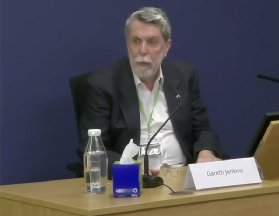
Former Fujitsu tech boss Gareth Jenkins was questioned for four days at the inquiry, such is the importance of what he knows.
He began acting as an expert IT witness to courts for the Post Office in the early 2000s, when the organisation was using computer evidence to prosecute subpostmasters who had unexplained shortfalls. But during his questioning, Jenkins revealed he did not actually understand the responsibilities attached to the role until 2020, years after he ceased to be an expert witness.
Jenkins, a mathematics graduate from Cambridge University and former senior engineer at Fujitsu, was a senior IT expert working on the Horizon system. He gave evidence in 15 prosecutions of subpostmasters up to 2013, when the Post Office was advised by a barrister to no longer use him as he had given misleading evidence in the past.
During his four-day inquiry appearance, Jenkins said he never received advice about his responsibilities as an expert witness. “The first time I became aware of my duties as an expert witness was when I was first put in touch with solicitors in 2020/21 as part of the police investigation into my conduct,” he said.
In 2013, Simon Clarke, a barrister at Cartwright King, told the Post Office that Jenkins had misled courts when giving evidence against subpostmasters accused of theft and false accounting by failing to mention software errors he was aware of. In what is known as The Clarke Advice, he wrote that Jenkins should not be used as an expert witness again.
Jenkins told the inquiry that his role was to tell the truth. Asked if he tailored his evidence accordingly, he disagreed and said: “I attempted to answer the questions I was asked.”
Jenkins said he was sorry for what happened, but added that he felt that was down to the way the Post Office behaved. “I clearly got trapped into doing things I should not have done,” Jenkins told the inquiry.
Read more about Gareth Jenkins’ oral evidence to the inquiry:
• Ignorance of ‘legal niceties’ from Post Office expert IT witness saw innocent people jailed
• Former Fujitsu engineer says Post Office ‘trapped’ him into giving incomplete evidence
The unrepresentative
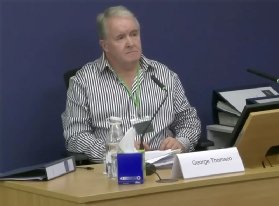
During his appearance at the Post Office scandal public inquiry, George Thomson, former National Federation of Subpostmasters (NFSP) general secretary from 2007 to 2018, was in denial over the Post Office Horizon scandal, which unfolded during his watch.
The man who headed up the federation, tasked with protecting the interests of subpostmasters, still believes prosecutions and suspensions after Horizon’s introduction were no different to those that occurred before. “I’ve been around a long time: suspensions have always taken place, prosecutions have always taken place, under the manual system as well, hundreds of subpostmasters suspended,” he told the inquiry. But the figures tell another story.
Read more about George Thomson’s oral evidence to the inquiry:
• Numbers prove former subpostmaster federati on boss’s ignorance over Post Office scandal
Civil servants left it to luck
The government left it to “luck” to monitor the Post Office management, which meant it missed opportunities to prevent the Horizon scandal and the suffering it caused, the public inquiry was told.
As an arms-length body, 100% owned by the government, the Post Office was free to run its business as it chose, with little government involvement.
According to evidence from Mark Russell, former CEO of UK Government Investments, the body that oversees the government shareholding in the Post Office, the board of directors was the only check on the organisation, with the government shareholder relying on “luck” should the Post Office board miss things.
During the latest hearing, barrister Christopher Jacobs, representing former subpostmasters, asked what mechanisms were in place for “detecting and dealing with situations such as in this case where senior executives acted in bad faith in covering up matters”.
Russell said: “The principle answer to that has to be the Post Office board because they are our oversight. They have the time, they have the capacity, they have the knowledge, and their function is to hold the executive to account. If they miss it, then we might just catch it, but I would have to say it is sort of luck. That said, we have missed things here, and it was a catastrophe.”
Read more about Mark Russell’s oral evidence to the inquiry:
• Government left monitoring of Post Office to ‘luck’
"No minister"
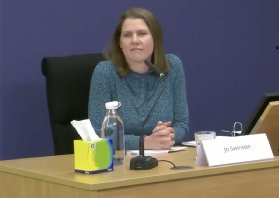
Sam Stein KC, representing victims of the scandal, summed it up when he said new ministers “took on the job of ignoring the Post Office”.
During an inquiry hearing, Stein put to Pat McFadden, who was a minister responsible for the Post Office between 2007 and 2010, that the government was receiving “unusual” and “particularly strong” allegations against the Post Office. “Subpostmasters being made to pay back money, prosecuted or turning to criminal acts [false accounting] is wholly unusual.”
McFadden agreed. Stein continued: “What happened next is your organisation went back to the Post Office, who the subpostmasters regarded as ‘the abuser’, asking, ‘What’s going on?’” Stein referred to the Post Office’s reply, which came from former CEO Alan Cook to Binley, which said there were no problems.
Read more about Pat McFadden’s oral evidence to the inquiry:
• Government trusted ‘abuser’ over the abused on Post Office scandal
Conservative peer Lucy Neville-Rolfe was questioned about her time as a minister when she oversaw the Post Office in 2015/16. Like ministers appearing in the latest phase of the inquiry, she reeled off examples of her questions about the Horizon scandal not being answered by the civil servants who were supposed to be supporting her.
The department formerly known as Shareholder Executive (ShEx), now UK Government Investments (UKGI), which looked after government-owned assets such as the Post Office, “lost its objectivity” in regard to the unfolding Post Office Horizon scandal, she told the inquiry.
She described an environment where the Post Office and ShEx civil servants were talking behind her back, and one where the department had “a foot in the Post Office camp”. She said that when she asked questions, rather than civil servants investigate claims, they would receive information directly from the Post Office.
Read more about Lucy Neville-Rolfe’s oral evidence to the inquiry:
• Former minister felt she was fighting department over Post Office controversy
Former government minister Margot James told the inquiry that getting to the truth was hampered because civil servants had “gone rogue” in their handling of the Post Office.
James, who was appointed minister in the Department for Business, Energy and Industrial Strategy (BEIS) in July 2016, said: “There was an assumption on the part of the Post Office board members that the subpostmasters were in the wrong [over Horizon],” she told the Post Office scandal inquiry. “I think that the Post Office board did regard them as incompetent at best and criminal at worst.”
She added that the Post Office was “extraordinarily good at seeing itself as the victim” by suggesting there was an “orchestrated campaign” from subpostmasters that had “no legitimacy”.
James said evidence showed that officials did not adhere to the civil service values of integrity, honesty, impartiality and objectivity. “It was an example of a team of people that should be following those principles that have gone rogue and abandoned them,” said James.
Read more about Margot James’ oral evidence to the inquiry:
• Post Office ‘acted the victim’ and civil servants ‘abandoned their principles’, says former minister
Current Liberal Democrat leader Ed Davey and former leader Jo Swinson were questioned by inquiry barristers about their time as ministers in the coalition government as the scandal was unfolding.
Davey was the minister in the business department in charge of the Post Office from 2010 to 2012, while Swinson took the helm after him until the coalition government ended in 2015. This was a period when MPs were raising questions on behalf of subpostmasters in their constituencies and there was increasing media coverage of the controversial issue.
Davey and Swinson detailed occasions when the actions of officials at ShEx prevented them from getting to the root of the Post Office scandal and acting on it.
Swinson and Davey were new to government, having joined the Conservative and Liberal Democrat Coalition government following the inconclusive 2010 general election. Swinson was minister in charge of the Post Office in 2012/13 and 2014/15. She told the latest public inquiry hearing that civil servants were “Orwellian” and “duplicitous” in how they withheld information from her regarding the Post Office.
Bates said: “From the testimony of those [from ShEx] in the inquiry last week, it is obvious that it is the civil servants who have to carry the bulk of the burden of blame.”
Read more about Ed Davey and Jo Swinson’s oral evidence to the inquiry:
• Ed Davey and Jo Swinson ‘handled’ by civil servants in Post Office cover-up, says Sir Alan Bates
Former Liberal Democrat leader Vince Cable told the inquiry that the Post Office was “authoritarian” in its dealings with subpostmasters, while fellow former Conservative minister Greg Clark was equally scathing of Post Office culture.
In his witness statement to the inquiry, Cable, who was secretary of state in the Business, Innovation and Skills (BIS) department from 2010 to 2015, also accused the Post Office of lying to civil servants in ShEx.
Meanwhile, Greg Clark, who was secretary of state for BEIS from 2016 to 2019, was asked about the Post Office culture. He said: “Drawing on my experience with my constituent, I am inclined to think the management of the Post Office was insensitive to the point of abject rudeness towards subpostmasters,” he told the inquiry.
Read more about Vince Cable and Greg Clark’s oral evidence to the inquiry:
• Vince Cable says the Post Office ‘lied’ to the government over Horizon issues
Phase seven – September 2024
This phase marked the end of oral evidence to the Post Office Scandal statutory public inquiry. It was all about today at the Post Office and a look into the future. The phase filled onlookers with real concern about the Post Office's direction and anger about some of the current goings on. Chair Wyn Williams will spend months putting together his final report, which is expected before the summer. The phase kicked off with the unwelcomed news that the Horizon system was still a real problem and later, through evidence from Fujitsu boss, Paul Patterson, it seems subpostmasters will be stuck with it for some time yet.
The phase also revealed the unpopularity of outgoing CEO, Nick Read, and his unpreparedness for the job, but more shockingly was evidence revealing a police investigation into a current employee over allegations of destroying documents of possible interest to the public inquiry.
Core of the problem – and still a problem
It all began with a computer system that didn’t work properly. This was proven to be the case in the High Court in 2019, and according to evidence presented in the latest phase of the Post Office Horizon IT Inquiry, looking at the here and now, subpostmasters are still struggling with the system.
Phase seven kicked off with Gavin Ellison, from research company YouGov, which was commissioned by the public inquiry to carry out a survey of subpostmasters to better understand their experiences of Horizon and the wider technology platform they use in branches.
The results were not reassuring. Perhaps the most startling finding was that three-quarters of 1,000 current subpostmasters have used their own branch money to cover discrepancies or resolved the issue themselves since 2020.
It also revealed that 57% of subpostmasters have experienced unexplained shortfalls, with 19% reporting unexplained transactions and 14% having had transactions go missing. Two-thirds said they were experiencing these issues at least once a month.
Also giving oral evidence in this phase was the National Federation of Subpostmasters CEO, Calum Greenhow. He told the inquiry that subpostmasters are currently living with disputed but unresolved debts to the Post Office. He said some cases have been going on for years, and demanded the Post Office bring that to an open and transparent conclusion.
Read more about YouGov’s survey of subpostmasters: Post Office system still causing unexplained shortfalls for over half of subpostmasters.
Read more about Calum Greenhow’s oral evidence: Subpostmasters living years with disputed but unresolved debts to the Post Office, inquiry told.
Chaos in reaching the horizon
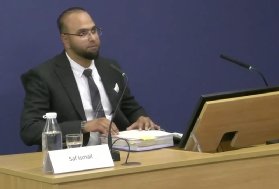
The YouGov numbers are another reminder to the Post Office that the Horizon system must go. Ever since the High Court judgment in 2019, which confirmed the system was error-prone, it has been obvious it is time to replace it. But the system is still hanging around, and the Post Office has made some huge mistakes in its rushed attempts to move away from Fujitsu’s software and services.
During a phase seven hearing, former Post Office chairman Henry Staunton and chief financial officer Alisdair Cameron said the New Branch IT (NBIT) project to replace the Horizon service lacks governance.
Saf Ismail, subpostmaster and non-executive director at the Post Office, also described some of the problems being experienced. Ismail told the inquiry that major mistakes when moving to a cloud platform resulted in £35m being spent with the sole gain to the Post Office being a new air-conditioning system.
The NBIT project was supposed to replace Horizon in 2025, after being announced in May 2022, but as revealed by Computer Weekly in May this year, the project hit major problems and the Post Office has requested £1bn of extra public funding from HM Treasury to get it back on track. The project has now been paused while the Post Office’s new leadership team decides the way forward.
Read more evidence to the inquiry revealing NBIT troubles: Post Office spending over £80,000 a week on engineers who can’t work as IT project burns cash.
Read more about Saf Ismail’s oral evidence: Post Office IT procurement mess saw £35m spent on air-conditioning, says board member.
Is there still rot at the core?
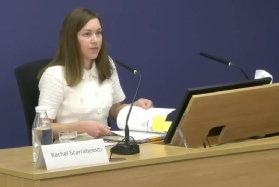
Police have been investigating individuals linked to the Post Office scandal since 2020, and earlier this year, following public uproar in relation to the Horizon scandal, a national investigation was announced by the Metropolitan Police.
But what was less known was the extent of the Post Office’s internal investigations related to the scandal.
During the appearance of the Post Office’s current company secretary, Rachel Scarrabelotti, a shocking revelation emerged that the Post Office was investigating one of its own senior managers, who had allegedly instructed staff to destroy documents that might be of interest to the public inquiry. The investigation has now been passed on to the police.
Read more about Rachel Scarrabelotti’s oral evidence to the inquiry: Post Office senior executive suspended over allegations of destroying evidence.
Culture of internal investigation
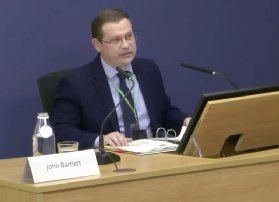
Former police officer John Bartlett, who now heads up the Post Office’s internal investigations, like the Met Police, has his hands full.
The inquiry heard his department had, in August this year as a snapshot, six major internal investigations on the go.
During Bartlett’s oral evidence, a document titled Post Office ad hoc board report was revealed, outlining the internal investigations underway at the Post Office in August.
They included Project Acer, an investigation into a manager who allegedly instructed staff to destroy material that could be of interest to the public inquiry, and Project Willow, which alleges that former transformation boss Chris Brocklesby misrepresented the off-the-shelf option to replace Horizon.
The document also revealed Project Alder, an investigation into allegations that contractors tasked with processing subpostmaster compensation schemes were deliberately going slow to extend their contracts, and Project Phoenix, which was investigating whether current Post Office staff were involved in the investigations and wrongful prosecutions of subpostmasters.
Then there’s Project Tiger, an investigation, overseen by acting CEO Neil Brocklehurst, set up to look into complaints from former subpostmaster and campaigner Tim McCormack about the Post Office’s handling of his recent freedom of information request responses.
Read more about internal investigations at the Post Office:
Former Post Office IT boss alleged to have misrepresented alternative to in-house build.
Who is the subject of the Post Office’s Project Tiger investigation?
Man on a mission
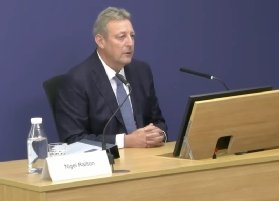
Post Office interim chairman Nigel Railton didn’t pussyfoot around the thorny issue of the NBIT project. He came right out with a claim that the NBIT project was “set up to fail” and needed to be reset.
He said two fundamental mistakes were made at the project’s outset – one was the decision to set the goal “to get off Horizon” rather than building a system for the future, and the second was the decision to build in-house.
Railton said there are many “horror stories” of people trying to build systems in-house, adding: “I think, based on my experience, that this was always set up to fail in the first place.”
Computer Weekly revealed later that the “writing is on the wall” for the Post Office’s plan to build the NBIT system in-house as it considers dumping it in favour of an off-the-shelf electronic point of sale (EPOS) alternative.
He also said the project is too reliant on third parties and likened it to the NHS being reliant on locum staff. A message has been sent to staff that the organisation is reassessing the project.
Read more about Nigel Railton’s evidence: Post Office IT transformation project was ‘set up to fail’, chairman tells inquiry.
Man who failed his mission
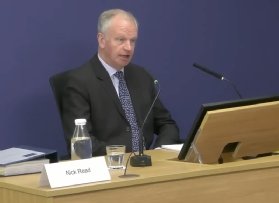
While Railton has set out his stall, one man that failed to achieve this is outgoing CEO Nick Read. He was brought in to steady the ship following the High Court judgment in 2019 and the exit of his disgraced predecessor Paula Vennells.
The inquiry had a taste of Read’s reputation before his arrival to give evidence. A damning whistleblowing letter, sent in May this year, was revealed during a recent hearing of the inquiry. It described a culture of lies and cover-ups in the organisation that employs him and has paid him millions of pounds to clean up.
A letter from Post Office staff to MPs, statutory inquiry chair Wyn Williams (pictured above) and the Post Office chairman, demanded their intervention and an investigation into the organisation’s leadership.
During Read’s evidence, it was revealed that the Post Office CEO job description advertised in 2019 didn’t mention the landmark High Court judgment against the organisation and its ramifications on the role. Nor were candidates made aware of the large and complex IT project that was required to replace the Post Office’s troubled Horizon IT system.
Read admitted, during his appearance at the inquiry, that the Post Office he led “dragged its feet” when dealing with employees who could have been involved in the wrongful prosecution of subpostmasters using flawed evidence.
He also revealed that the company so far estimates that individuals running branches repaid around £36m to cover the unexplained shortfalls.
Read more about Nick Read at the inquiry:
Under-fire Nick Read was unprepared for Post Office challenge.
Post Office dragging its feet in getting rid of tainted staff, despite government ‘green light’.
Post Office currently believes it took £36m from subpostmasters with unexplained losses.
Cost-cutting discussions ‘like drawing teeth’
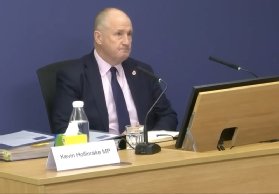
Former Post Office minister Kevin Hollinrake was critical of Read’s inability to cut costs within the organisation to help it escape its financial struggles. During his appearance at the inquiry, Hollinrake revealed that 143 people working for the perpetually loss-making and government-backed Post Office earn over £100,000 per year.
Yet Hollinrake described his meetings with Read about cutting costs as being like “drawing teeth”, with the CEO seemingly unable to grasp the nettle.
But politicians also received criticism. During his appearance at the inquiry, Simon Recaldin, who heads up the Post Office’s schemes to provide financial redress to victims of the scandal, described the government’s take it or leave it offer of £600,000 to subpostmasters wrongly convicted as “political”. He told the inquiry the Post Office was not consulted on the offer, and while he supported it, he questioned how the policy was “imposed on the Post Office”.
Read more about Kevin Hollinrake’s evidence to the inquiry: Post Office was reluctant to cut costs despite 143 central staff earning more than £100,000.
Read more from Simon Recaldin at the inquiry: Government’s £600,000 offer to Horizon scandal victims was ‘political’.
Marriage of convenience on the rocks
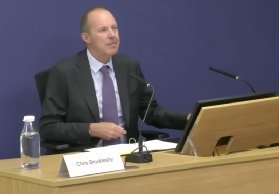
There is a long history between Fujitsu and the Post Office, which began when the government decided the Post Office would take the Horizon system in the late 1990s.
In 1998, following a meeting between the British ambassador to Japan and Fujitsu executives, the British embassy in Tokyo wrote to the UK government warning it of serious economic repercussions, including UK job losses and reductions in trade, if the Horizon contract with the Post Office were, as feared, to be cancelled.
The system was developed by government IT specialist IT supplier ICL, which was acquired by Fujitsu. This saved ICL and gave Fujitsu access to a lucrative public sector market, which it still enjoys today.
But although the relationship has, at times, been toxic, the companies have been joined at the hip when it comes to defending the Horizon system and shifting blame for shortfalls onto the subpostmasters. Not anymore – the relationship has fallen apart and the two organisations can’t wait to see the back of each other.
Chris Brocklesby, chief transformation officer at the Post Office until recently, gave evidence to the inquiry in phase seven. He described a strained relationship between the two organisations.
He also said when he arrived at the Post Office in August 2023, there was no realistic plan in place for the delivery of a Horizon replacement, despite the plan of record being that NBIT would be deployed by March 2025.
Brocklesby said when he started his role, little to no software had been delivered.
Fujitsu knew this, but was still demanding that the Post Office appoint someone to manage its exit from the Horizon contract. During the hearing, he accused Fujitsu of “game playing”.
Later evidence in the inquiry revealed there is currently a standstill agreement over potential civil litigation between the supplier and the Post Office, meaning the two organisations have agreed not to take legal action against each other for a certain period of time.
Read more about Chris Brocklesby’s oral evidence: Post Office and Fujitsu – from blood brothers to bad blood.
Post Office misappropriated funds
Civil servants have featured throughout the public inquiry, with the evidence accompanying them often of the most revelatory variety.
Alex Chisholm, former chief operating officer and permanent secretary for the Cabinet Office, was no exception. During his evidence, it was revealed that the Post Office wrongly spent millions of pounds of taxpayers’ money to fund its High Court legal battle with subpostmasters.
The Post Office had wrongly spent at least £2.3m of public money in this way, and also wrongly requested a further £2.4m, before civil servants spotted it and put a stop to it.
Also appearing before the inquiry was Lorna Gratton, the civil servant who currently sits as a non-executive director of the Post Office on behalf of the government. Her evidence session revealed that the Horizon system is going to be investigated again, with a third party to be appointed imminently.
In relation to the discrepancies that subpostmasters continue to experience when using the Horizon system, she told the inquiry: “The Post Office executive team are in the process of appointing an independent third-party review of Horizon and its robustness.”
Read more about Alex Chisholm’s oral evidence at the inquiry: Post Office wrongly used public funds to pay for legal battle.
Read more about Lorna Gratton’s appearance at the inquiry: Post Office appointing third-party reviewer of current Horizon system.
Fujitsu’s fighting talk
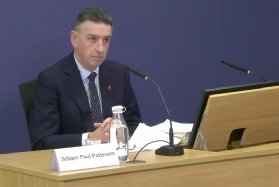
Fujitsu boss Paul Patterson was profusely apologetic when he first gave oral evidence in January, during phase four of the inquiry, but this time around, Patterson appeared to have done many rounds of sparring with company lawyers. He came out fighting. Gone was the apologetic, grovelling executive, replaced by an aggressive figure punching back.
During his appearance, Patterson said the past seven months of inquiry hearings had revealed that many organisations were to blame for the scandal – not just Fujitsu and its faulty software. This is true, but where was this in his last appearance and where was he for the previous 24 months of the inquiry?
He also described the perilous state that Horizon is in having reached the end of its life and been starved of investment.
Read more about Paul Patterson’s latest oral evidence to the inquiry:
Post Office scandal not caused by software errors, says combative Fujitsu boss.
Read more on IT for retail and logistics
-
![]()
Post Office scandal: Inquiry’s final phase exposes dysfunction past and present
-
![]()
Post Office scandal: Phases 5 and 6 had islands of conscientiousness in great depths of neglect
-
![]()
IT witness was hidden away from Post Office court battle, but supported it from shadows
-
![]()
Post Office scandal: Phase four’s rogues’ gallery








